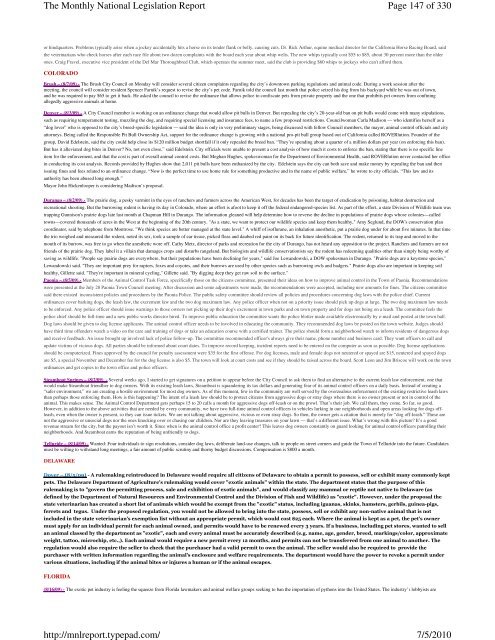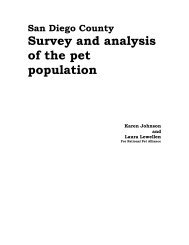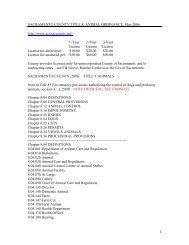Page 1 of 330 The Monthly National Legislation Report 7/5/2010 ...
Page 1 of 330 The Monthly National Legislation Report 7/5/2010 ...
Page 1 of 330 The Monthly National Legislation Report 7/5/2010 ...
Create successful ePaper yourself
Turn your PDF publications into a flip-book with our unique Google optimized e-Paper software.
<strong>The</strong> <strong>Monthly</strong> <strong>National</strong> <strong>Legislation</strong> <strong>Report</strong>http://mnlreport.typepad.com/<strong>Page</strong> 147 <strong>of</strong> <strong>330</strong>7/5/<strong>2010</strong>or hindquarters. Problems typically arise when a jockey accidentally hits a horse on its tender flank or belly, causing cuts. Dr. Rick Arthur, equine medical director for the California Horse Racing Board, saidthe veterinarians who check horses after each race file about two dozen complaints with the board each year about whip welts. <strong>The</strong> new whips typically cost $55 to $85, about 30 percent more than the olderones. Craig Fravel, executive vice president <strong>of</strong> the Del Mar Thoroughbred Club, which operates the summer meet, said the club is providing $60 whips to jockeys who can't afford them.COLORADOBrush – (8/7/09) - <strong>The</strong> Brush City Council on Monday will consider several citizen complaints regarding the city’s downtown parking regulations and animal code. During a work session after themeeting, the council will consider resident Spencer Farnik’s request to revise the city’s pet code. Farnik told the council last month that police seized his dog from his backyard while he was out <strong>of</strong> town,and he was required to pay $65 to get it back. He asked the council to revise the ordinance that allows police to confiscate pets from private property and the one that prohibits pet owners from confiningallegedly aggressive animals at home.Denver – (8/3/09) - A City Council member is working on an ordinance change that would allow pit bulls in Denver. But repealing the city’s 20-year-old ban on pit bulls would come with many stipulations,such as requiring temperament testing, muzzling the dog, and requiring special licensing and insurance fees, to name a few proposed restrictions. Councilwoman Carla Madison — who identifies herself as a“dog lover” who is opposed to the city’s breed-specific legislation — said the idea is only in very preliminary stages, being discussed with fellow Council members, the mayor, animal control <strong>of</strong>ficials and cityattorneys. Being called the Responsible Pit Bull Ownership Act, support for the ordinance change is growing with a national pro-pit bull group based out <strong>of</strong> California called ROVERlution. Founder <strong>of</strong> thegroup, David Edelstein, said the city could help close its $120 million budget shortfall if it only repealed the breed ban. “<strong>The</strong>y’re spending about a quarter <strong>of</strong> a million dollars per year (on enforcing this ban).But has it alleviated dog bites in Denver? No, not even close,” said Edelstein. City <strong>of</strong>ficials were unable to present a cost analysis <strong>of</strong> how much it costs to enforce the ban, stating that there is no specific lineitem for the enforcement, and that the cost is part <strong>of</strong> overall animal control costs. But Meghan Hughes, spokeswoman for the Department <strong>of</strong> Environmental Health, said ROVERlution never contacted her <strong>of</strong>ficein conducting its cost analysis. Records provided by Hughes show that 2,011 pit bulls have been euthanized by the city. Edelstein says the city can both save and make money by repealing the ban and thenissuing fines and fees related to an ordinance change. “Now is the perfect time to use home rule for something productive and in the name <strong>of</strong> public welfare,” he wrote to city <strong>of</strong>ficials. “This law and itsauthority has been abused long enough.”Mayor John Hickenlooper is considering Madison’s proposal.Durango – (8/2/09) - <strong>The</strong> prairie dog, a pesky varmint in the eyes <strong>of</strong> ranchers and farmers across the American West, for decades has been the target <strong>of</strong> eradication by poisoning, habitat destruction andrecreational shooting. But the burrowing rodent is having its day in Colorado, where an effort is afoot to keep it <strong>of</strong>f the federal endangered-species list. As part <strong>of</strong> the effort, a state Division <strong>of</strong> Wildlife team wastrapping Gunnison's prairie dogs late last month at Chapman Hill in Durango. <strong>The</strong> information gleaned will help determine how to reverse the decline in populations <strong>of</strong> prairie dogs whose colonies—calledtowns—covered thousands <strong>of</strong> acres in the West at the beginning <strong>of</strong> the 20th century. "As a state, we want to protect our wildlife species and keep them healthy," Amy Seglund, the DOW's conservation plancoordinator, said by telephone from Montrose. "We think species are better managed at the state level." A whiff <strong>of</strong> is<strong>of</strong>lurane, an inhalation anesthetic, put a prairie dog under for about five minutes. In that timethe trio weighed and measured the rodent, noted its sex, took a sample <strong>of</strong> ear tissue, picked fleas and daubed red paint on its back for future identification. <strong>The</strong> rodent, returned to its trap and moved to themouth <strong>of</strong> its burrow, was free to go when the anesthetic wore <strong>of</strong>f. Cathy Metz, director <strong>of</strong> parks and recreation for the city <strong>of</strong> Durango, has not heard any opposition to the project. Ranchers and farmers are notfriends <strong>of</strong> the prairie dog. <strong>The</strong>y label it a villain that damages crops and disturbs rangeland. But biologists and wildlife conservationists say the rodent has redeeming qualities other than simply being worthy <strong>of</strong>saving as wildlife. "People say prairie dogs are everywhere, but their populations have been declining for years," said Joe Lewandowski, a DOW spokesman in Durango. "Prairie dogs are a keystone species,"Lewandowski said. "<strong>The</strong>y are important prey for raptors, foxes and coyotes, and their burrows are used by other species such as burrowing owls and badgers." Prairie dogs also are important in keeping soilhealthy, Gillette said. "<strong>The</strong>y're important in mineral cycling," Gillette said. "By digging deep they get raw soil to the surface."Paonia – (8/5/09) - Members <strong>of</strong> the Animal Control Task Force, specifically those on the citizens committee, presented their ideas on how to improve animal control in the Town <strong>of</strong> Paonia. Recommendationswere presented at the July 28 Paonia Town Council meeting. After discussion and some adjustments were made, the recommendations were accepted, including new amounts for fines. <strong>The</strong> citizens committeesaid there existed inconsistent policies and procedures by the Paonia Police. <strong>The</strong> public safety committee should review all policies and procedures concerning dog laws with the police chief. Currentordinances cover barking dogs, the leash law, the excrement law and the two dog maximum law. Any police <strong>of</strong>ficer when not on a priority issue should pick up dogs at large. <strong>The</strong> two dog maximum law needsto be enforced. Any police <strong>of</strong>ficer should issue warnings to those owners not picking up their dog's excrement in town parks and on town property and for dogs not being on a leash. <strong>The</strong> committee feels thepolice chief should be full-time and a new public works director hired. To improve public education the committee wants the police blotter made available electronically by e-mail and posted at the town hall.Dog laws should be given to dog license applicants. <strong>The</strong> animal control <strong>of</strong>ficer needs to be involved in educating the community. <strong>The</strong>y recommended dog laws be posted on the town website. Judges shouldhave third time <strong>of</strong>fenders watch a video on the care and training <strong>of</strong> dogs or take an education course with a certified trainer. <strong>The</strong> police should form a neighborhood watch to inform residents <strong>of</strong> dangerous dogsand receive feedback. An issue brought up involved lack <strong>of</strong> police follow-up. <strong>The</strong> committee recommended <strong>of</strong>ficer's always give their name, phone number and business card. <strong>The</strong>y want <strong>of</strong>ficers to call andupdate victims <strong>of</strong> vicious dogs. All parties should be informed about court dates. To improve record keeping, incident reports need to be entered on the computer as soon as possible. Dog license applicationsshould be computerized. Fines approved by the council for penalty assessment were $35 for the first <strong>of</strong>fense. For dog licenses, male and female dogs not neutered or spayed are $15, neutered and spayed dogsare $5, a special November and December fee for the dog license is also $5. <strong>The</strong> town will look at court costs and see if they should be raised across the board. Scott Leon and Jim Briscoe will work on the townordinances and get copies to the town <strong>of</strong>fice and police <strong>of</strong>ficers.Steamboat Springs – (8/2/09) - Several weeks ago, I started to get signatures on a petition to appear before the City Council to ask them to find an alternative to the current leash law enforcement, one thatwould make Steamboat friendlier to dog owners. With its existing leash laws, Steamboat is squandering its tax dollars and generating fear <strong>of</strong> its animal control <strong>of</strong>ficers on a daily basis. Instead <strong>of</strong> creating a“safer environment,” we are creating a hostile environment for most dog owners. As <strong>of</strong> this moment, few in the community are well served by the overzealous enforcement <strong>of</strong> the existing restrictive leash lawsthan perhaps those enforcing them. How is this happening? <strong>The</strong> intent <strong>of</strong> a leash law should be to protect citizens from aggressive dogs or stray dogs where there is no owner present or not in control <strong>of</strong> theanimal. This makes sense. <strong>The</strong> Animal Control Department gets perhaps 15 to 20 calls a month for aggressive dogs <strong>of</strong>f-leash or on the prowl. That’s their job. We call them, they come. So far, so good.However, in addition to the above activities that are needed by every community, we have two full-time animal control <strong>of</strong>ficers in vehicles lurking in our neighborhoods and open areas looking for dogs <strong>of</strong>fleash,even when the owner is present, so they can issue tickets. We are not talking about aggressive, vicious or even stray dogs. So then, the owner gets a citation that is merely for “dog <strong>of</strong>f-leash.” <strong>The</strong>se arenot the aggressive or unsocial dogs nor the ones knocking over or chasing our children. Nor are they leaving treasures on your lawn — that’s a different issue. What’s wrong with this picture? It’s a goodrevenue stream for the city, but the payout isn’t worth it. Since when is the animal control <strong>of</strong>fice a pr<strong>of</strong>it center? This leaves dog owners constantly on guard looking for animal control <strong>of</strong>ficers patrolling theirneighborhoods. And Steamboat earns the reputation <strong>of</strong> being unfriendly to dogs.Telluride – (8/14/09) - Wanted: Four individuals to sign resolutions, consider dog laws, deliberate land-use changes, talk to people on street corners and guide the Town <strong>of</strong> Telluride into the future. Candidatesmust be willing to withstand long meetings, a fair amount <strong>of</strong> public scrutiny and thorny budget discussions. Compensation is $800 a month.DELAWAREDover – (8/5/09) - A rulemaking reintroduced in Delaware would require all citizens <strong>of</strong> Delaware to obtain a permit to possess, sell or exhibit many commonly keptpets. <strong>The</strong> Delaware Department <strong>of</strong> Agriculture's rulemaking would cover "exotic animals" within the state. <strong>The</strong> department states that the purpose <strong>of</strong> thisrulemaking is to "govern the permitting process, sale and exhibition <strong>of</strong> exotic animals", and would classify any mammal or reptile not native to Delaware (asdefined by the Department <strong>of</strong> Natural Resources and Environmental Control and the Division <strong>of</strong> Fish and Wildlife) as "exotic". However, under the proposal thestate veterinarian has created a short list <strong>of</strong> animals which would be exempt from the "exotic" status, including iguanas, skinks, hamsters, gerbils, guinea-pigs,ferrets and tegus. Under the proposed regulation, you would not be allowed to bring into the state, possess, sell or exhibit any non-native animal that is notincluded in the state veterinarian's exemption list without an appropriate permit, which would cost $25 each. Where the animal is kept as a pet, the pet's ownermust apply for an individual permit for each animal owned, and permits would have to be renewed every 3 years. If a business, including pet stores, wanted to sellan animal classed by the department as "exotic", each and every animal must be accurately described (e.g. name, age, gender, breed, markings/color, approximateweight, tattoo, microchip, etc.,). Each animal would require a new permit every 12 months, and permits can not be transferred from one animal to another. <strong>The</strong>regulation would also require the seller to check that the purchaser had a valid permit to own the animal. <strong>The</strong> seller would also be required to provide thepurchaser with written information regarding the animal's enclosure and welfare requirements. <strong>The</strong> department would have the power to revoke a permit undervarious situations, including if the animal bites or injures a human or if the animal escapes.FLORIDA(8/16/09) - <strong>The</strong> exotic pet industry is feeling the squeeze from Florida lawmakers and animal welfare groups seeking to ban the importation <strong>of</strong> pythons into the United States. <strong>The</strong> industry’s lobbyists are




